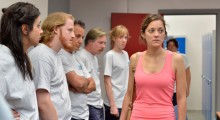Dardenne Brothers
-
Cannes 2025: Awards, Young Mothers, Sentimental Value, Resurrection

The cinema world was quick to juxtapose an image from the climax of this year’s award ceremony—where Iranian director Jafar Panahi took home the Palme d’Or for his generously-received It Was Just an Accident—alongside one in which this year’s jury president Juliette Binoche protested Panahi’s 2010 arrest and imprisonment while she accepted her Best Actress prize for Certified Copy. The latter image, one of the most indelible of recent Cannes history, also circulated a bit after the lineup was announced several weeks before the festival began, as many doubted Binoche’s capacity for impartiality. Whether or not Panahi’s film needed only […]
by Blake Williams on May 26, 2025 -
Cannes 2022: Stars at Noon, Tori and Lokita

In France, I mostly don’t get immediately ID’d as American, which I assume is partially because I don’t conform to braying jackass US tourist type and partially because, the older I get, the more I look indeterminately “other.” Generally I first get spoken to in French and play along if I can, then when I can’t keep up I get “Do you speak English?” This is pretty flattering and will obviously only be an increasing asset as the American Experiment continues to go up in flames. A friend noted that, with its virulent displays of racism, Cristian Mungiu’s R.M.N. could just as […]
by Vadim Rizov on May 27, 2022 -
“We Didn’t Try to Colonize the Boy in Making the Film”: The Dardenne Brothers on Young Ahmed

For 20 years running, the films of Jean-Pierre and Luc Dardenne have confronted a single fundamental facet of modern life: class. From their breakout La Promesse (1996) to The Unknown Girl (2016), the messy tangle of money, employment, and morality has defined their work. The brothers take a hard turn, in subject if not style, with Young Ahmed. The film debuted at Cannes, like their previous seven features, where it won the Best Director prize earlier this year. Despite that honor–which they won over Almodóvar, Tarantino, and Malick among other heavyweights–the film has earned the harshest reviews of the Dardennes’ career. […]
by Soheil Rezayazdi on Oct 4, 2019 -
Birth of The Son

Over the past two decades, the Dardenne brothers have cemented their status as socially conscious, ethically committed filmmakers; their attention to the underrepresented, working-class corners of Belgian society has opened their audience’s eyes to the complexity of these often-unseen lives. To read their diaries, which were published in two volumes in France in 2005 and 2015 and are now coming out in English this June and next June, is to understand how deeply their films are rooted in their reading and their determination to shape the chaos of real life into the moral arc of redemption. It is telling that […]
by Luc Dardenne on Jun 19, 2019 -
Cannes 2019 Dispatch 4: Lux Æterna, Jeanne, Young Ahmed

Gaspar Noé may never mature in the ways his detractors wish (rather, many of them long for the day that he disappears completely), and yet his work, especially from his erotic 3D film, Love (2015), to the present, continues to surprise me. Creator of his own distinct cinematic idiom—one almost always described as both formally and thematically extreme—Noé returns to Cannes only a year after his Directors’ Fortnight success story, Climax, with a medium-length, stroboscopic, essayistic polyptych titled Lux Æterna. Even as Lux opens with a gently flickering title card that quotes Fyodor Dostoevsky on epilepsy—a state he said offers […]
by Blake Williams on May 22, 2019 -
Watch: Diametric Composition in Two Days, One Night

Jean-Pierre and Luc Dardenne are consistently lauded for their naturalistic brand of social realist dramas, but this video essay from Marshall Shaffer digs a little deeper, putting forth Two Days, One Night as an argument for the brothers’ masterful (and largely undiscussed) use of composition. Through varied backdrops and physical obstacles, the brothers repeatedly cleave their frames in two, reflecting the emotional discord between Sandra (Marion Cotillard) and her co-workers. The favoring of subtle and organic barriers, Shaffer argues, provides a nice contrast to the exacting compositions of Kubrick, Anderson, and other directors who are frequently cited as the gold standard.
by Sarah Salovaara on Aug 27, 2015 -
“We Know How a Solar Panel is Made”: The Dardennes on Two Days, One Night

As a parable of solidarity, Two Days is programmatic and predictable in a way that’s new to the Dardenne brothers, and not in a good way; as a streamlined narrative, it’s impeccably crafted. The straight-up chase scene dropped into 2005’s L’enfant — a potential audition for a rote action film should they ever feel so inclined — indicated Jean-Luc and Pierre Dardenne’s handheld, ever-impassioned kineticism was reaching new levels of sheer technical proficiency. Two Days, One Night presents the dilemma of Sandra (Marion Cotillard) — fired from her solar panel factory job, ostensibly so the plant can remain competitive on a playing field leveled by Chinese labor. It’s clear […]
by Vadim Rizov on Dec 22, 2014 -
Down in the Boondocs: The NYFF’s Go-To Films (I)

The expansive New York Film Festival is no longer the greatest-hits affair of three decades back when it was built around 20-25 titles, a majority of which were what had been on display at the previous Cannes. The arrangement was a gift and a curse: manageable, for both journalists and completists, but limited. I remember what a production it was when the fest dared to add a lowbrow Hong Kong movie by one Jackie Chan. Now there are lots and lots of strands, which cover a variety of genres and niche audiences — followers of the avant-garde and new technologies, […]
by Howard Feinstein on Sep 26, 2014 -
“THE KID WITH A BIKE” DELIVERS
The latest film by the exceptional Belgian brothers Jean-Pierre and Luc Dardenne is their most integrated, and arguably their finest achievement. Its visuals are airier, its sound richer, in part on account of the atypical inclusion of music (chords from Beethoven’s ethereal piano concerto Adagio un Poco Mosso). The film was originally called Deliver Me!, a title which could apply to any of their projects. Redemption is a constant in their work—not redemption of the heavy-handed sort, or payoff for introspection and devotion, but salvation intricately bound up with those on the margins, proletarians who are neither intellectually gifted nor spiritually inclined. […]
by Howard Feinstein on Mar 16, 2012 -
The Kid with a Bike — A Hammer to Nail Review
(Jean-Pierre and Luc Dardenne’s The Kid with a Bike premiered at the 2011 Cannes Film Festival, where it shared the Grand Prix with Once Upon a Time in Anatolia. It is being released theatrically by Sundance Selects on 03.16.12.) The Kid with a Bike is propelled by eruptive moments nestled between long stretches of calm. That it is seen through the eyes of a child too young and confused to understand as much about himself as the viewer does would appear to make the eponymous bicycle rider’s case an ironic one, but it mostly just makes it sad. Every time […]
by Michael Nordine on Mar 15, 2012
